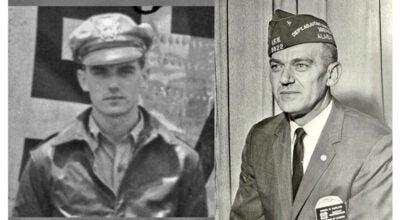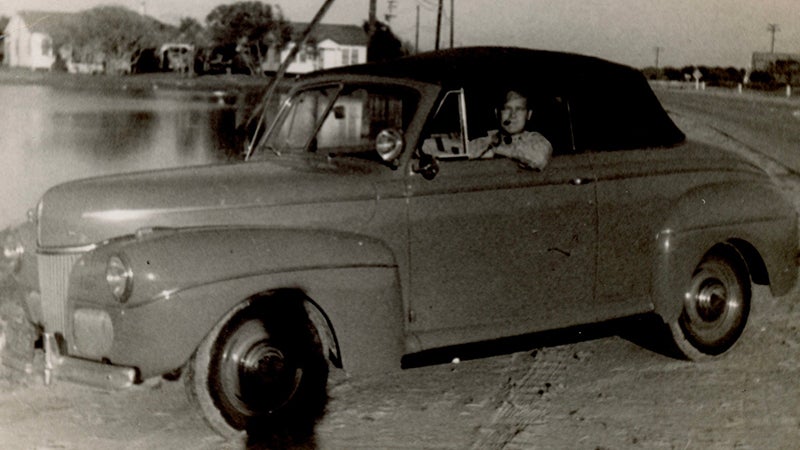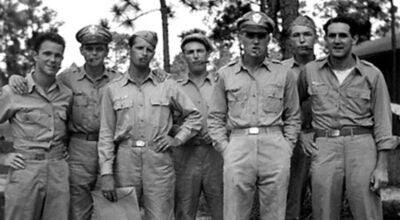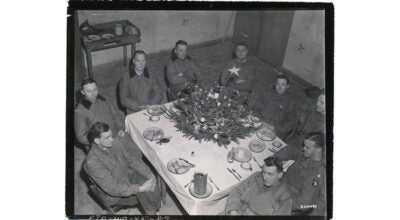Dentist or Doctor? On Iwo Jima, He Was Both: William G. King, Lieutenant, U.S. Navy Dental Corps, WWII Part 1
Published 2:30 pm Friday, October 7, 2022
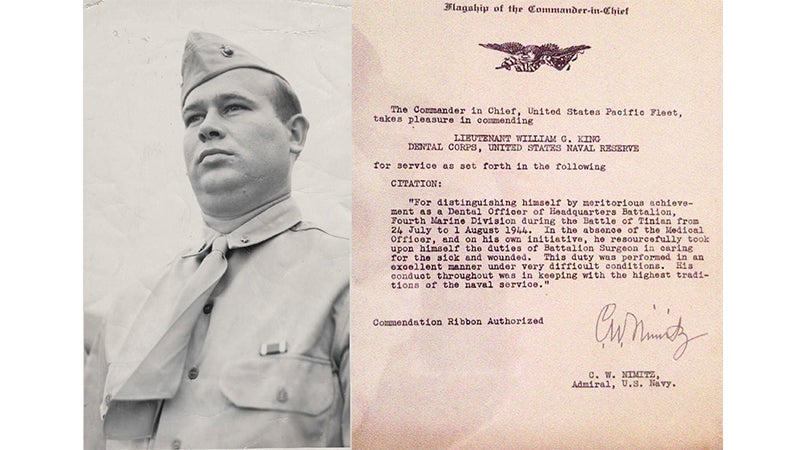
- LEFT: Lt. William G. King wearing the Commendation ribbon received from Admiral Nimitz. [Photo: Mrs. Helen King] RIGHT: Letter of Commendation from Admiral Chester W. Nimitz to Lt. William G. King for his taking over the duties of Battalion Surgeon on the island of Tinian during the U.S. invasion. [Photo: Mrs. Helen King]
|
Getting your Trinity Audio player ready...
|
Somehow, the young man from Luverne, Alabama, had not envisioned himself on the black, volcanic rock of an island called Iwo Jima when he graduated from dental school. He was less than three years out of a small dental college in Atlanta, when he found himself pulling teeth as well as treating wounded Marines on Iwo Jima. Lieutenant William G. King had already distinguished himself during the Invasion of Tinian and earned a letter of commendation from Admiral Chester W. Nimitz, Commander-in-Chief, U.S. Seventh Fleet.
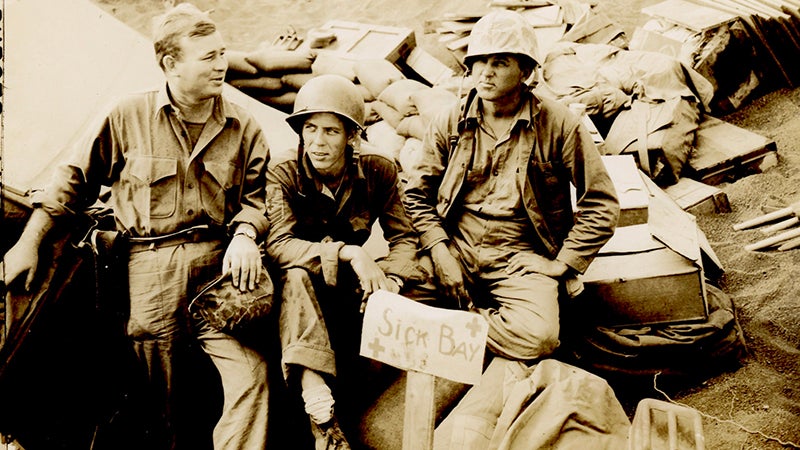
Lt. William G. King [left] at an aid station at the foot of the air strip on Iwo Jima, 1945. [Photo: Mrs. Helen King]
The young dentist practiced for a short time in his hometown of Luverne, Alabama, before being called to active duty and sent to Corpus Christi Naval Air Station, Corpus Christi, Texas. Lt. William King had bought a new 1941 Ford convertible. You can imagine the popularity of the newly commissioned Navy officer among the ladies of Corpus Christi. When he completed his training in Texas, he was ordered to Camp Pendleton Marine Corps Base near San Diego, California. King drove his car to California, sold it and placed the money in a safety deposit box for the future purchase of an engagement ring.
Camp Pendleton was the home of the 4th Marine Division and King was assigned to the HQ Company, HQ Battalion, 4th Marine Division. After training was completed at Camp Pendleton, the 4th Marine Division was shipped to Camp Maui on the Hawaiian island of Maui. Camp Maui was the Amphibious Training Center for the Marines who were about to become part of the Allied island-hopping campaign in the Pacific. Amphibious warfare required intensive combat training and the coordination of air, sea and ground forces. During the tough, two years that the 18,000 Marines practiced amphibious landings at Camp Maui, they suffered more than 1,100 casualties and 212 deaths. The 4th Marines left Camp Maui for the invasion in the Marshall Islands [Majuro, Kwajalein and Eniwetok] in January 1944.
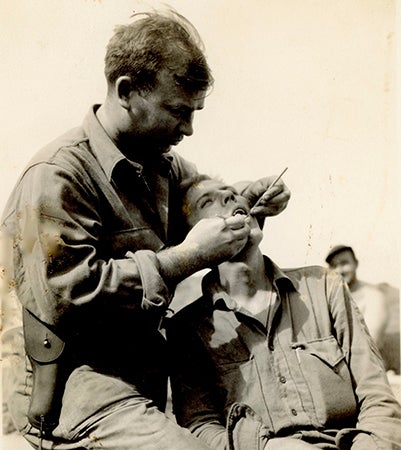
Lt. William G. King performing dental care on Iwo Jima during WWII. Note the sidearm on his hip. [Photo: Mrs. Helen King]
In August 1944, the 4th Marines returned to Camp Maui to recuperate and replenish men and supplies. By January 1945, the Marines were ready to begin the 4,000-mile voyage to Iwo Jima. The invasion of Iwo Jima began on February 19, 1945 and the island was not considered secure until March 26. Lt. William G. King found himself thrust into the middle of what is considered the greatest battle ever fought by the United States Marine Corps. And once again, King would take on the duties of a dentist and a doctor.
The work to save lives on Iwo Jima was an ongoing, all-hands-effort by doctors and dentists. The author would like to quote from an article dated Sunday, March 4, 1945, that appeared in The Alabama Journal, titled, “70 Mangled Marines Saved by Heroic Navy Medical Men.” The article was written by 2nd Lt. Jim G. Lucas [formerly of The Tulsa Tribune], who was a Marine Corps public relations officer:
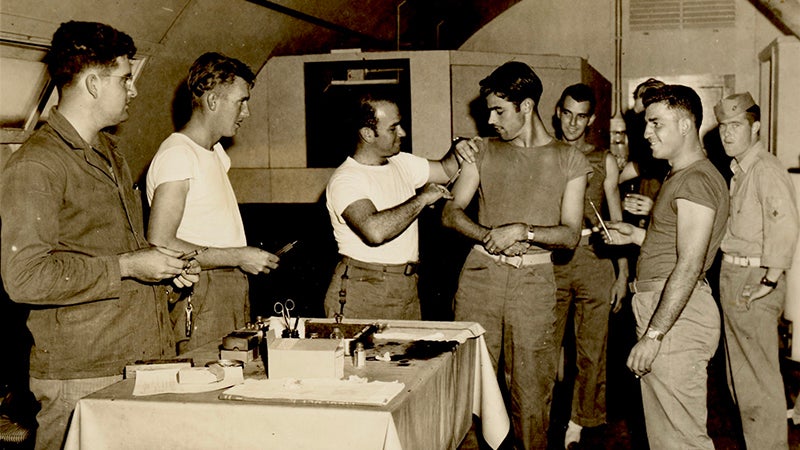
Lt. William G. King giving inoculations at Camp Maui, Hawaii, prior to invasions in the Pacific during WWII. [Photo: Mrs. Helen King]
Lt. William King’s efforts to treat wounded Marines onboard an improvised hospital ship was not the last time he was called upon to fulfill the duties of a medical doctor. He would soon find himself treating wounded Marines on the dangerous and inhospitable island of Iwo Jima.
[To be continued]
John Vick
[Sources: Wikipedia; Naval history and Heritage Command; The Alabama Journal, article by 2nd Lt. Jim G. Lucas [Marine Corps Public Relations Officer], “70 Mangled Marines Saved by Heroic Navy Medical Men,” dated March 4, 1945]The author thanks Dr. William G. “Bill” King, Jr. and his mother, Mrs. Helen King for providing information about the late Dr. William G. King, Sr. Mrs. Helen King is 100 years old and is as sharp as most 40-year-olds and a delight to talk to.
More COLUMN -- FEATURE SPOT
